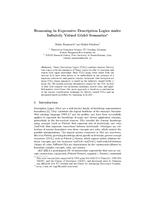Reasoning in Expressive Description Logics under Infinitely Valued Gödel Semantics
Aus International Center for Computational Logic
Reasoning in Expressive Description Logics under Infinitely Valued Gödel Semantics
Stefan BorgwardtStefan Borgwardt, Rafael PeñalozaRafael Peñaloza
Stefan Borgwardt, Rafael Peñaloza
Reasoning in Expressive Description Logics under Infinitely Valued Gödel Semantics
In Carsten Lutz, Silvio Ranise, eds., Proceedings of the 10th International Symposium on Frontiers of Combining Systems (FroCoS'15), Lecture Notes in Artificial Intelligence, 49–65, 2015. Springer
Reasoning in Expressive Description Logics under Infinitely Valued Gödel Semantics
In Carsten Lutz, Silvio Ranise, eds., Proceedings of the 10th International Symposium on Frontiers of Combining Systems (FroCoS'15), Lecture Notes in Artificial Intelligence, 49–65, 2015. Springer
- KurzfassungAbstract
Fuzzy Description Logics (FDLs) combine classical Description Logics with the semantics of Fuzzy Logics in order to represent and reason with vague knowledge. Most FDLs using truth values from the interval [0,1] have been shown to be undecidable in the presence of a negation constructor and general concept inclusions. One exception are those FDLs whose semantics is based on the infinitely valued Gödel t-norm (G). We extend previous decidability results for the FDL G-ALC to deal with complex role inclusions, nominals, inverse roles, and qualified number restrictions. Our novel approach is based on a combination of the known crispification technique for finitely valued FDLs and an automata-based procedure for reasoning in G-ALC. - Projekt:Project: HAEC B02
- Forschungsgruppe:Research Group: AutomatentheorieAutomata Theory
@inproceedings{BP2015,
author = {Stefan Borgwardt and Rafael Pe{\~{n}}aloza},
title = {Reasoning in Expressive Description Logics under Infinitely
Valued G{\"{o}}del Semantics},
editor = {Carsten Lutz and Silvio Ranise},
booktitle = {Proceedings of the 10th International Symposium on Frontiers of
Combining Systems (FroCoS'15)},
series = {Lecture Notes in Artificial Intelligence},
publisher = {Springer},
year = {2015},
pages = {49{\textendash}65}
}
